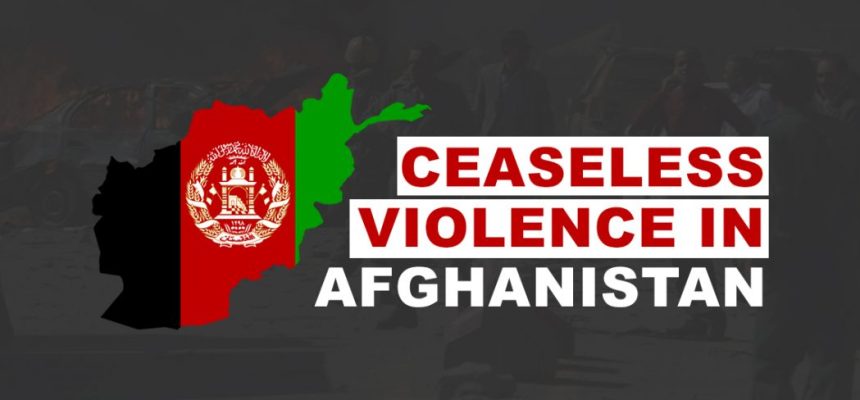The third-largest city in Afghanistan, Herat, was turned into a battleground last week when a bomb went off outside a mosque during Friday prayers, killing prominent pro-Taliban preacher Mujib Rahman Ansari, among others. According to the governor of Herat province’s spokesman, HameedullahMotawakel, at least 18 people have been killed and 23 others have been injured in the event. The number of casualties is anticipated to increase.
According to reports, the incident was a suicide strike. According to the police investigation, before setting off the explosives, the suicide bomber kissed the imam’s hand as he arrived at Gazargah Mosque to conduct Friday prayers. The Taliban’s spokesman, ZabihullahMujahid, declared: “The country’s courageous and influential scholar was martyred in a brutal, cowardly attack.”
The Islamic State (IS) organisation is suspected of carrying out the attack. IS has already acknowledged that Rahimullah Haqqani was killed in a bomb on August 11, 2022. The bomber set up explosives that were hidden within a prosthetic leg. The preacher who was assassinated favored female education and was sympathetic to the Taliban.
Mujib Rahman Ansari has publicly opposed the US-supported regimes that allowed the presence of Western armies in Afghanistan. In August 2021, the US-led government left Afghanistan, and it was predicted that when the foreign soldiers left, a new wave of terrorism would sweep the already-devastated nation. The Taliban claim that since seizing control of the nation, Afghanistan’s security has increased. However, this ignores the numerous bombings that have struck mosques while they were open for prayer.
Read More: US Failure in Afghanistan: Who to Blame?
“In the last few years, any religious scholar who has enjoyed support across Afghanistan… or supported the government… [is] the potential target of such attacks,” said LutfullahLutf, an Afghan journalist and political commentator. Egypt has denounced the horrific tragedy and shown support for the families of the victims.
Since 2022, Afghanistan has been a victim of these bombings. Earlier, on January 22, 2022, a minivan was demolished in Herat by a bomb that killed six people. The attack’s perpetrator, Islamic State, claimed responsibility. On April 19, 2022, a series of explosions reverberated over the Hazara Shiite neighborhoods of Kabul, leaving at least six people dead and around eleven wounded, including children. These explosions took place near the Mumtaz Education Center and at Abdul Rahim Shaheed High School. Eight people were killed and 18 others were injured when a bomb exploded within a Shiite Muslim religious gathering on August 5, 2022. It was determined that the Islamic State terrorist group was behind the tragedy.
On April 22, 2022, a bombing at the Khanaqa-e-Malawi Sikandar mosque in Kunduz Province resulted in the destruction of a Sufi mosque in northern Afghanistan. Thirty people were murdered, and over a dozen were injured. Another bomb struck the Abu Bakr Siddique mosque in northern Kabul on August 17, 2022, during evening prayers. The mosque’s imam, Mullah Amir Mohammad Kabuli, was among the victims.
“We deplore yesterday’s attack in a Kabul mosque, the latest in a disturbing series of bombings which have killed and injured more than 250 people in recent weeks, the highest monthly number of civilian casualties over the last year,” the UN Assistance Mission in Afghanistan stated.
Read More: Afghanistan’s Power vacuum and its implications for the Region
The western Herat region had earlier been shaken by a bomb on March 12, 2021, only a few months prior to the US-led troops’ exit from Afghanistan in August 2021. Over fifty people were injured and seven people were killed when an explosives-filled van exploded in a crowded area. Ashraf Ghani, who was Afghanistan’s president at the time, attributed the attack to the Taliban.
Following the latest terrorist assaults, the government of Afghanistan will need to reassess the effectiveness of its security system. The nation lags decades behind neighboring nations and the rest of the globe and has already suffered a great loss of life and property.
The Council on Foreign Relations (CFR) reported that the Taliban took back control of Afghanistan in 2021 after waging a 20-year struggle. The Taliban endanger Afghans’ civil and political rights, which are codified in the constitution written by the U.S.-backed government, according to CFR Editor Lindsay Maizland in the study. The Taliban have acted in a manner reminiscent of their ruthless rule in the late 1990s since reclaiming power.
Read More: Afghanistan: The Economic Game Changer
Speaking about the status quo of females in the country, she added, “The UN mission in Afghanistan has documented numerous human rights violations. Women have seen their rights obliterated. The Taliban have prohibited most girls from attending secondary school and prevented women across the country from working.”
Before it’s too late, the Taliban and the Afghan government must eliminate the threat posed by IS. The Taliban’s reign has diminished due to their lack of advancement in the area of human rights, and the world has yet to realize this. In order to reduce the impact and threat of IS, regional South Asian nations must develop a plan in cooperation with Afghanistan.
The development of a plan that would put Afghanistan one step ahead of the Islamic State should be spearheaded by the current Afghan administration. This will enable the Afghan government to develop a tactical strategy to thwart IS’s future objectives. Afghanistan’s future will remain dark and even endanger the state’s very survival if the IS threat is not diminished and the group is not dismantled.






